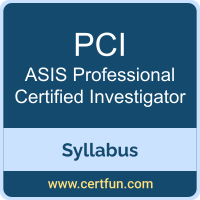 Use this quick start guide to collect all the information about ASIS PCI Certification exam. This study guide provides a list of objectives and resources that will help you prepare for items on the ASIS Professional Certified Investigator (PCI) exam. The Sample Questions will help you identify the type and difficulty level of the questions and the Practice Exams will make you familiar with the format and environment of an exam. You should refer this guide carefully before attempting your actual ASIS Professional Certified Investigator (PCI) certification exam.
Use this quick start guide to collect all the information about ASIS PCI Certification exam. This study guide provides a list of objectives and resources that will help you prepare for items on the ASIS Professional Certified Investigator (PCI) exam. The Sample Questions will help you identify the type and difficulty level of the questions and the Practice Exams will make you familiar with the format and environment of an exam. You should refer this guide carefully before attempting your actual ASIS Professional Certified Investigator (PCI) certification exam.
The ASIS PCI certification is mainly targeted to those candidates who want to build their career in Investigative domain. The ASIS Professional Certified Investigator (PCI) exam verifies that the candidate possesses the fundamental knowledge and proven skills in the area of ASIS PCI.
ASIS PCI Exam Summary:
| Exam Name | ASIS Professional Certified Investigator (PCI) |
| Exam Code | PCI |
| Exam Price |
ASIS Members: $580 (USD) Nonmembers: $910 (USD) |
| Duration | 150 mins |
| Number of Questions | 140 |
| Passing Score | 80% |
| Schedule Exam | ASIS |
| Sample Questions | ASIS PCI Sample Questions |
| Practice Exam | ASIS PCI Certification Practice Exam |
ASIS PCI Exam Syllabus Topics:
| Topic | Details |
|---|---|
Professional Responsibility (28%) |
|
| Analyze case for applicable ethical conflicts. |
Knowledge of:
|
| Assess case elements, strategies, and risks. |
Knowledge of:
|
| Determine investigative goals and develop strategy. |
Knowledge of:
|
| Determine and manage investigative resources. |
Knowledge of:
|
| Identify, evaluate, and implement investigative process improvements. |
Knowledge of:
|
Investigative Techniques and Procedures (52%) |
|
| Conduct surveillance by physical, behavioral, digital, and electronic means. |
Knowledge of:
|
| Conduct interviews of individuals. |
Knowledge of:
|
| Collect and preserve evidence. |
Knowledge of:
|
| Conduct research by physical, digital, and electronic means. |
Knowledge of:
|
| Collaborate with and obtain information from other agencies and organizations. |
Knowledge of:
|
| Use investigative techniques. |
Knowledge of:
|
Case Presentation (20%) |
|
| Prepare report to substantiate investigative findings. |
Knowledge of:
|
| Prepare and present testimony. |
Knowledge of:
|
To ensure success in ASIS PCI certification exam, we recommend authorized training course, practice test and hands-on experience to prepare for ASIS Professional Certified Investigator (PCI) exam.
